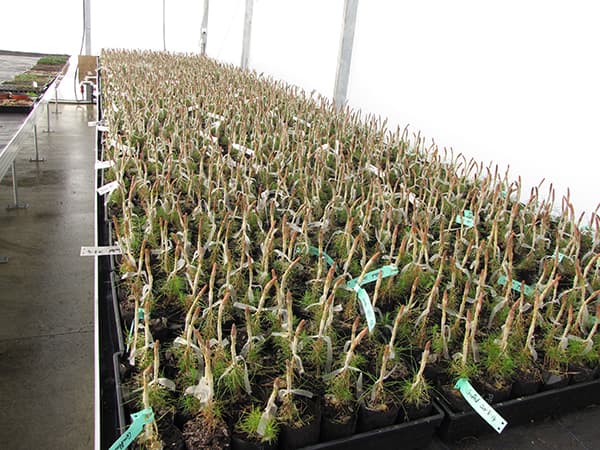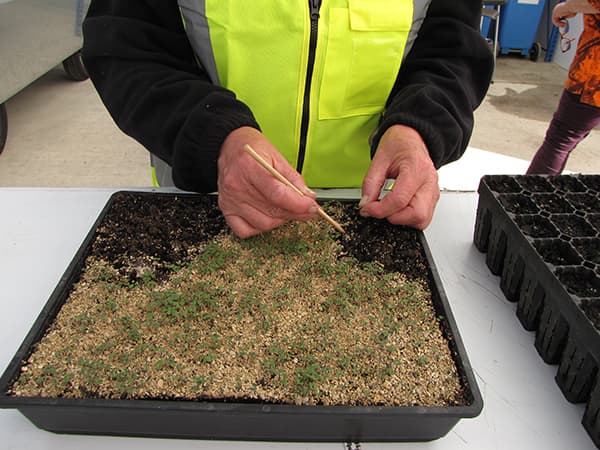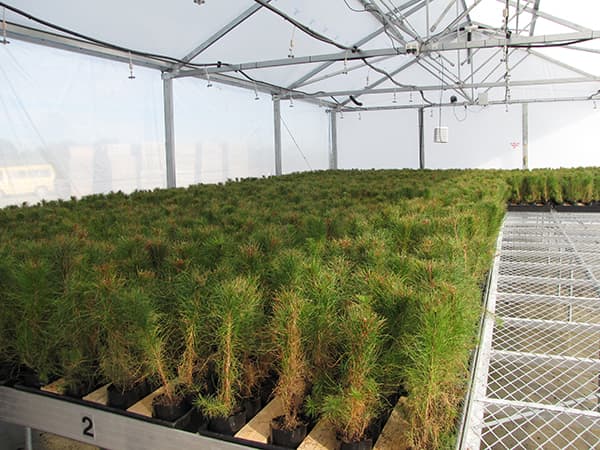While radiata pine will always be the major forest species, opportunities exist to develop niche products to meet changing demand and difficult environments. Proseed is continually looking for new opportunities and products and has been active in all areas of seed production and tree breeding since its establishment in 1987. While much of Proseed's internal research is of an operational nature, the company is a member of three major New Zealand research groups:
- Radiata Pine Breeding Company (RPBC)
- Specialty Wood Products (SWP)
- New Zealand Dryland Forestry Initiative (NZDFI)
Radiata Pine Breeding
A founding member of the RPBC, Proseed now represents its sister company, Ngai Tahu Forestry on the technical committee for the breeding programme and manages the RPBC breeding orchard north of Amberley. The function of the RPBC is to provide improved genetic material from its breeding programme to shareholders. It is the sole source of certified genetic material in New Zealand and has over 5,000 selections in replicated trials throughout New Zealand and Australia. The trials test the performance of traits such as growth, form, branching, wood density, wood stiffness, resin pockets, checking, and Dothistroma resistance. The RPBC has 15 New Zealand and 3 Australian shareholders who are typically large forest owners and management companies. Collectively, shareholders manage over 1 million hectares of radiata pine - www.rpbc.co.nz.
Proseed is currently replacing sections of its CP orchard with new selections from the breeding programme. This began in 2014 and is an ongoing process. A further round of replacements are planned to follow as the RPBC releases new selections suitable for deployment in seed orchards.
Specialty Wood Products
The key objective is to produce higher-value, better-performing timber products matched to specialty markets. Key global market trends identifed include demand for high-stiffness timbers, naturally durable timbers, dark and rich-coloured timbers, and a strong sustainability brand. Specialty species have the potential to supply these markets, and also have the potential to complement the mainstream radiata pine industry through improving the performance of engineered wood products. Proseed is a key player in the breeding of all species managed under the SWP programme particularly E. nitens, E. fastigata and E. regnans as well as C. macrocarpa and C. lusitanica - http://fgr.nz/programmes/alternative-species/
Durable Wood (NZDFI)
NZDFI is a research and tree breeding partnership that is developing genetically improved eucalyptus planting stock, management systems and timber processing options for durable hardwood eucalypt species adapted to drier regions along NZ’s dryland east coast. The long term objective is to ensure the supply of improved nursery stock sufficient for planting 100,000 ha of eucalypt forests to create a multi-regional sustainable durable hardwood products industry. Established in Marlborough in 2008, the NZDFI partners are: Proseed; Vineyard Timbers Ltd; Marlborough Research Centre Trust (MRCT) and University of Canterbury’s School of Forestry (UC SoF). Since 2014 Proseed has established seed orchards of E. bosistoana, E. cladocalyx and E. globoidea and produced rooted E. bosistoana cuttings for clonal testing.
Hybrids
Proseed is actively developing a hybrid pine programme. Field trials of Pinus radiata x P. attenuata hybrids established by Scion and Proseed in the late 1990's, show the now mid-rotation hybrids to be tolerant of cold and dry conditions, and to have good resistance to snow.
The hybrids were first produced as possible alternatives to radiata pine for southern conditions. Parent trees were selected for growth and form, and seedlots trialled at various South Island sites. Sixteen years later at mid-rotation, the hybrids are demonstrating the cold and snow resistance of P. attenuata combined with the faster growth of P. radiata particularly at higher altitudes.
"Based on these results we have been promoting hybrids to South Island forest growers and making seed commercially available for the past five years,” says Shaf van Ballekom. “These hybrids show superior performance with good resistance to cold and drought compared with the individual species. Companies have already begun planting them particularly in snow prone areas.”
Genomics
This is the next stage in radiata breeding. Conceptually, it offers major gains and therefore profitability to forest growers. The essence of genomic breeding is the SNP (Single Nucleotide Polymorphism – pronounced as “snip”) which is simply a difference in a single DNA building block, called a nucleotide. The Radiata Pine Breeding Company (RPBC) has an array of SNP's (known as a SNP Chip) which it is using to confirm the pedigrees of its breeding material. Work continues on identifying SNP's that correlate with key traits such as growth and disease resistance. Reliable SNP's will generate breeding values and allow thousands of genotypes to be characterised quickly. This will reduce the breeding cycle and deliver new selections to seed orchards and clonal programmes ultimately improving the value of members' forests.



